
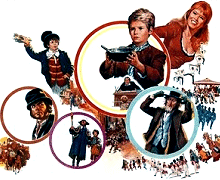

|
 |
|
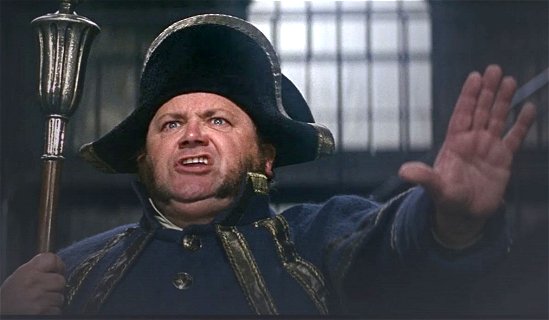 |
Who
could forget the angelic Mark Lester playing the title role in this film.
Adapted from the original 'Oliver Twist' by Charles Dickens, and Lionel
Bart's 1960 stage musical, the story is set in 1830s London. The film used
mostly young, unknown actors including Mark Lester (Oliver) and Jack Wild
as The Artful Dodger, but also featured more established names such as Hugh
Griffith, an Oscar winner for Ben-Hur and Harry Secombe as Mr. Bumble. Oliver Reed, who played Bill Sikes, was suggested to director Carol Reed for the role by producer John Woolf, not knowing that the two were actually related as nephew and uncle. Shani Wallis was given the role of Nancy, despite many feeling that it should have been played by Georgia Brown who had played the role in the West End stage production. The role of Fagin was taken by Ron Moody who admitted that he initially viewed the character part as "pretty vicious and unpleasant; I didn't want to do that. I didn't want to perpetuate what I considered to be an unfair, unpleasant image of Jewish people". It has been recorded that Ron and Lionel Bart made a conscious decision to move the role of Fagin away from the antisemitic stereotype of the original novel and the Alec Guinness depiction in the 1948 adaptation in preparation for the 1961 stage show and "bring it into more of an entertainment situation". Released in the UK on 26th September 1968 (20th December in the USA), the film was directed by Carol Reed (director of 'The Third Man'). Produced by John Woolf, screenplay by Vernon Harris and with music by Lionel Bart and John Green, it was the highest grossing musical of 1968 at $37,402,877. |
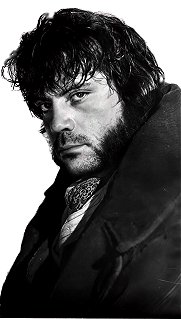 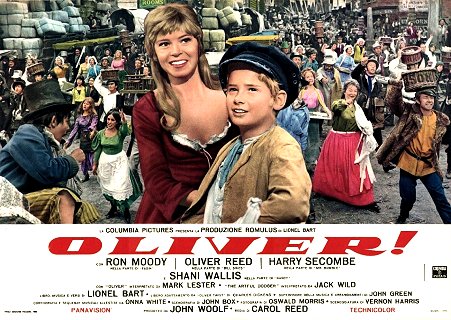 |
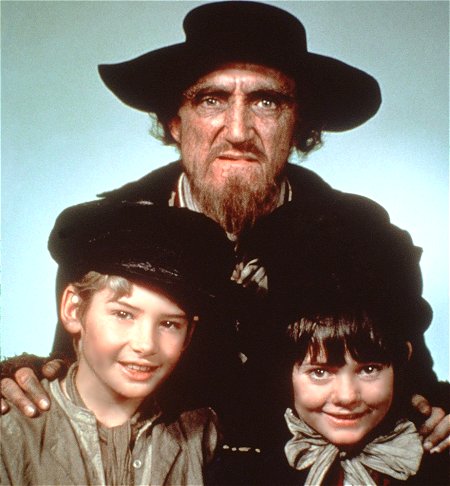 |
At
a workhouse in Dunstable where orphans are served gruel daily, Oliver is
chosen when a group of boys draw lots to see who will approach Mr. Bumble
and the Widow Corney to ask for more. An enraged Bumble takes Oliver to
the workhouse governors for punishment, and then puts him up for sale as
an apprentice. He is bought by Mr. Sowerberry, an undertaker, but is bullied
by another apprentice, Noah Claypole. Oliver retaliates, but is locked in
a cellar from which he manages to escape when he discovers that a window
grate is unlocked, and proceeds to run away. On reaching London, he meets the Artful Dodger who befriends him and takes him back to a hideout for young pickpockets led by Fagin, who instructs his 'gang' in the art of stealing. Fagin meets with a burglar, Bill Sikes and his girlfriend Nancy to discuss some 'business'. On his return he goes through his secret cache of treasures, but waking Oliver in the process, who startles him. He tries to explain the secret horde as something to help him in his old age. The following morning Nancy and her friend Bet come to collect Sikes's money from Fagin and the boys make fun of Oliver for being polite to her, but she finds it quite charming. The boys are sent out for the day, with Oliver teaming up with the Artful Dodger who steals a wallet from Mr. Brownlow. Oliver is mistaken for being the thief and Brownlow has the police arrest him. Fagin and Sikes send Nancy to court as they fear that he might give away the location of the hideout but Oliver is too scared to speak. A bookseller, Mr. Jessop, testifies that Oliver is innocent and Brownlow takes Oliver in. Fagin and Sikes decide to abduct Oliver and return him to the gang, with Nancy's help, but Nancy refuses as she has come to care for Oliver. Sikes beats her and forces her to assist, but despite this she still loves Sikes. Mr. Brownlow sends Oliver on an errand but, before leaving, Oliver sees a painting of a pretty young girl and Mr. Brownlow notes Oliver's resemblance her. It is a picture of his niece, Emily, who disappeared some years ago, and begins to suspect he may be related. While he is out, Oliver is grabbed by Nancy and Sikes who take him back to Fagin's den. An argument erupts over Oliver's future and who keeps the items that Brownlow has handed to Oliver. Oliver resists and Sikes starts to beat him but is stopped by Nancy. She remorsefully reviews their life, but Sikes maintains that any way of living is better than none and she leaves in disgust. Fagin tries to soothe things over and suggests that they sit and talk things out, but Sikes refuses and, taking Fagin by the scruff of the neck, declares that if anyone ratted on them he will kill Fagin. Fagin thinks about giving up his criminal life, but can't see an alternative. Bumble and Corney pay Brownlow a visit as he begins searching for Oliver's history. They show a locket that had belonged to Oliver's mother. She had arrived at the workhouse penniless and died during childbirth. Brownlow recognises the locket as having belonged to his niece. Meanwhile, trying to induce Oliver into a life of crime, Sikes forces him to take part in a house robbery, which fails when Oliver accidentally awakens the occupants. They manage to escape, but while they are gone Nancy becomes fearful for Oliver's life. She goes to Brownlow and admits to taking part in Oliver's kidnapping but, for her own safety, refuses to give the names of Fagin or Bill Sikes. She promises Brownlow that she will return Oliver at midnight on London Bridge and then goes to The Three Cripples tavern. Sikes and Oliver return, but Sikes orders his dog 'Bullseye' to guard the boy. Nancy starts up a noisy drinking song in the hope that this will distract Sikes, but 'Bullseye' alerts Sikes, who chases after them. As Oliver and Nancy share a farewell hug on London Bridge, Sikes appears. Grabbing both of them, he throws Oliver aside and drags Nancy behind a staircase, violently bludgeoning and fatally injuring her. He takes off with Oliver, but 'Bullseye' refuses to follow Sikes and returns to the scene where Nancy has been killed and alerts the police. The dog then leads Brownlow and an angry mob towards the thieves' hideout. Sikes arrives at Fagin's hideaway and demands money, revealing that he has killed Nancy, but on seeing the approaching mob, they both flee. Sikes takes Oliver to use as a hostage. During their escape from the mob, Fagin has lost his valuables possessions, which sink into the river mud. Sikes tries to escape by fleeing to an adjacent roof using Oliver as a shield but is shot while swinging between the buildings. Oliver is rescued by the police and Fagin decides to change his ways for good but, just as he is about to walk away the Dodger appears from nowhere with a wallet he stole earlier. They run off into the sunrise together, determined to live out the rest of their days as thieves while Oliver returns to Brownlow's home. |
| Songs |
Cast | |||
|
"Overture" "Food, Glorious Food" "Oliver!" "Boy for Sale" "Where Is Love?" "Consider Yourself" "You've Got To Pick a Pocket or Two" "It's A Fine Life! "I'd Do Anything" "Be Back Soon" "Who Will Buy?" "As Long as He Needs Me" "Reviewing the Situation" "Oom-Pah-Pah" "Reviewing the Situation" (reprise) "Consider Yourself" (finale) "My Name" (Bill Sikes' theme) |
John
Green and Orchestra Kathe Green and Boys' Chorus Harry Secombe, Peggy Mount and Boys' Chorus Harry Secombe Kathe Green Jack Wild, Kathe Green and Chorus Ron Moody and Boys Shani Wallis, Sheila White and Chorus Jack Wild, Shani Wallis, Kathe Green, Sheila White, Ron Moody and Boys Ron Moody, Jack Wild and Boys Kathe Gtreen and Chorus Shani Wallis Ron Moody Shani Wallis and Chorus Ron Moody and Jack Wild Chorus John Green and Orchestra |
Ron
Moody Shani Wallis Oliver Reed Harry Secombe Mark Lester Jack Wild Hugh Griffith Joseph O'Conor Peggy Mount Leonard Rossiter Hylda Baker Kenneth Cranham Megs Jenkins Sheila White Wensley Pithey James Hayter Elizabeth Knight |
Fagin Nancy Bill Sikes Mr Bumble Oliver The Artful Dodger Magistrate Mr Brownlow Mrs Bumble Sowerberry Mrs Sowerberry Noah Claypole Mrs Bedwin Bet Dr Grimwig Mr Jessop Charlotte |
|
All
original material is copyright
Other copyrights may also apply from images or material owners. |